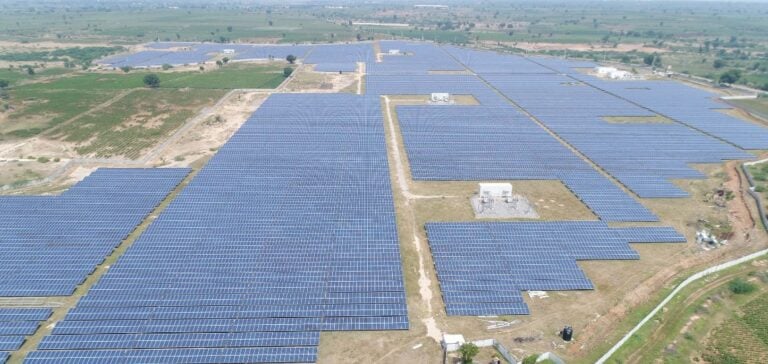India is embarking on a major energy transformation, aiming to achieve 500 GW of renewable energy capacity by 2030.
This ambitious project represents more than double current capacity and is part of a broader strategy to reduce carbon emissions in the country, which is the world’s third largest emitter after China and the USA.
The initiative is backed by significant financial commitments, totalling $386 billion, mainly from banks and financial institutions.
These funds are earmarked for the construction of new infrastructure, in particular solar and wind power plants, which are essential to achieving this objective.
Major players in the sector, such as Reliance Industries and Adani Green Energy, have announced significant expansion projects, with pledges to add 100 GW and 38.8 GW respectively.
These commitments illustrate the mobilization of the private sector in favor of the energy transition.
At the same time, the Indian government encouraged project developers to submit their proposals to the RE-Invest conference, underlining the importance of collective commitment to overcoming the challenges of this transition.
Energy Infrastructure Challenges
Despite the enthusiasm for renewable energies, India faces major challenges that could hamper the achievement of its goals.
Among these challenges, transmission bottlenecks are proving particularly problematic.
Existing transmission infrastructures are often not adapted to handle the growing integration of renewable energy, limiting the ability to deliver the energy produced to consumption areas.
Regions such as Rajasthan and Gujarat, with high solar potential, face difficulties in transporting this energy to remote urban centers.
In addition, land acquisition for new transmission and distribution infrastructure is a significant obstacle.
Electricity distribution companies, often state-run, have to navigate a complex regulatory framework and face protracted negotiations with landowners.
This process can significantly slow down the development of projects needed to support the growth of renewable energies.
Necessary Reforms and Modernization
To overcome these challenges, structural reforms are essential.
The Indian states, which manage the majority of distribution networks, need to modernize their infrastructures to enable better integration of renewable energies.
At the RE-Invest conference, it was stressed that the adoption of best practices in energy management is crucial.
This includes modernizing distribution networks, improving billing systems and reducing technical losses.
At the same time, the development of transmission corridors dedicated to renewable energy is essential.
The Green Energy Corridor initiative, supported by international funding, aims to establish a network capable of transporting clean energy over long distances with minimal losses.
This type of investment is crucial to achieving the target of 500 GW of renewable capacity by 2030.
DISCOM Financial Management
The financial health of electricity distribution companies (DISCOMs) is also a major issue.
Many DISCOMs face high debt levels and non-payment problems to power producers.
The Indian government has introduced the UDAY (Ujwal DISCOM Assurance Yojana) scheme to improve the financial situation of DISCOMs, but results remain mixed.
Further measures are needed to stabilize their financial situation and attract more investment to the sector.
The challenges associated with DISCOM management are exacerbated by high technical and commercial losses, which can reach up to 40% in some states.
These losses reflect inefficient management and underline the need for systemic reform to improve DISCOMs’ operational and financial performance.
Projections and future prospects
In terms of capacity, India currently has around 153 GW of renewable energy installed.
To reach the target of 500 GW by 2030, the country needs to add around 44 GW per year, a challenge that requires considerable investment and resolution of infrastructure issues.
According to the International Energy Agency (IEA), India will need to invest around $1.4 trillion in the renewable energy sector by 2040 to meet its climate and energy targets.
Despite these challenges, India continues to face a growing demand for electricity, exacerbated by economic growth and heat waves.
This situation is driving the country to maintain a significant share of coal-fired power generation, with a projected 8.9% increase in coal production in 2024-2025, outstripping the 8.2% growth in renewable energies.
This dependence on coal underlines the complexity of the energy transition that India must manage.
The financial commitments and expansion plans of private companies show a willingness to transform, but the success of this transition will depend on India’s ability to balance its immediate energy needs with its long-term renewable energy goals.
Necessary reforms, investment in infrastructure and rigorous management of DISCOMs will be key to navigating this period of change.





















